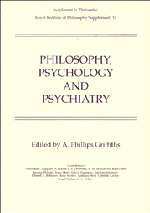Book contents
- Frontmatter
- Contents
- Preface
- Introduction: Just Getting Started
- Mind and Madness: New Directions in the Philosophy of Psychiatry
- Emotion and Memory: The Second Cognitive Revolution
- Meaning and Mechanism in Psychotherapy and General Psychiatry
- Making Sense on the Boundaries: On Moving Between Philosophy and Psychotherapy
- Mental Disorder, Illness and Biological Disfunction
- Integrity, Boundary and the Ecology of Personal Processes
- Multiple Personality and Computational Models
- Psychology and Politics: Lies, Damned Lies and Self-Deception
- Personal Identity and Psychiatric Illness
- Vices and the Self
- Wild Beasts and Idle Humours: Legal Insanity and the Finding of Fault
- Dangerousness and Mental Disorder
- Problems with the Doctrine of Consent
- Homosexuality
- Nietzsche and Music
- References
- Notes on Contributors
Meaning and Mechanism in Psychotherapy and General Psychiatry
Published online by Cambridge University Press: 03 May 2011
- Frontmatter
- Contents
- Preface
- Introduction: Just Getting Started
- Mind and Madness: New Directions in the Philosophy of Psychiatry
- Emotion and Memory: The Second Cognitive Revolution
- Meaning and Mechanism in Psychotherapy and General Psychiatry
- Making Sense on the Boundaries: On Moving Between Philosophy and Psychotherapy
- Mental Disorder, Illness and Biological Disfunction
- Integrity, Boundary and the Ecology of Personal Processes
- Multiple Personality and Computational Models
- Psychology and Politics: Lies, Damned Lies and Self-Deception
- Personal Identity and Psychiatric Illness
- Vices and the Self
- Wild Beasts and Idle Humours: Legal Insanity and the Finding of Fault
- Dangerousness and Mental Disorder
- Problems with the Doctrine of Consent
- Homosexuality
- Nietzsche and Music
- References
- Notes on Contributors
Summary
A little knowledge is a dangerous thing
(Pope)If a little knowledge is dangerous, where is the man who has so much as to be out of danger
(T. H. Huxley)On New year's Eve 1992 a man suffering from schizophrenia climbed into a lions' cage at the London Zoo and was badly mauled. This event provoked a full-scale moral panic among the media and government, the tragedy seeming to violate many of the comfortable myths about progress in psychiatry, echoing the impact of the civil war in former Yugoslavia which had shattered the hope of an era of unbroken European peace following the end of the cold war. Whatever we may wish in reality the lion does not lie down with the lamb. Daniel the visionary, the interpreter of dreams, the one who asserted that his God, the God of angels and saints with power over man and beasts would eventually endure, while all earthly kings were found wanting, emerged from the lions' den unscathed—but secular, psychiatric, suffering, decarcerated, visionless, late-twentieth-century man does not.
In Daniel the vision and the reality, the soothsayer and the king, are kept separate. The story of the triumph of spiritual powers is perhaps a compensatory phantasy expressing the aspirations of an oppressed and displaced Jewish nation. In our society psychotherapists are cast in the role of visionaries, while psychiatry represents power and adaptation.
- Type
- Chapter
- Information
- Philosophy, Psychology and Psychiatry , pp. 41 - 54Publisher: Cambridge University PressPrint publication year: 1995



